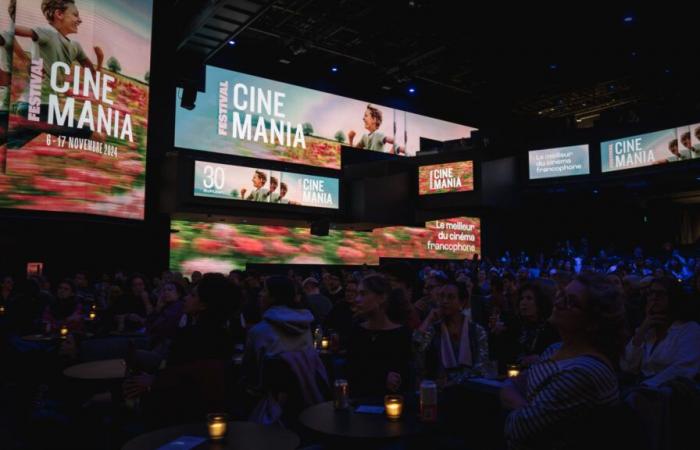Celebrating its 30th anniversary, the Cinemania Festival offers us a selection of films as diverse as they are captivating, reflecting the richness of contemporary cinema. It is precisely this variety that makes this French-speaking film festival, with the largest scale in North America, a unique event. Let’s take a close-up of four of their nuggets.
Mr Aznavour : small in size, but larger than life
Presented as an international premiere during the gala evening marking the 30e anniversary of the Cinemania Festival, Mr Aznavourdirected by Grand Corps Malade and Mehdi Idir, stars Tahar Rahim in the role of the legendary singer. From the first images, we are immersed in the childhood memories of Charles Aznavour, son of Armenian refugees settled in Paris, who grew up in the heart of the Second World War and poverty. His modest beginnings are filmed with an accuracy that reveals the essence of the man before the legend, and lays the foundations for a stubborn opportunist’s journey. Self-taught, he writes, composes and performs his songs; his versatility testifies to his desire to succeed and, supported by his first stage accomplice Pierre Roche (played by Bastien Bouillon), Aznavour walks the Parisian cabarets to achieve this goal.
Together, they come under the mentorship of Édith Piaf (played by Marie-Julie Baup), who inspires them to pursue their careers in Montreal. The complicity between Piaf and Aznavour is approached with finesse: the film presents the interpreter of The hymn to love like a second mother who, through her gestures, both kind and abrupt, helps to shape the iconic Aznavour that we know. The film is marked by appearances of other emblematic figures of the time which surprise, such as Frank Sinatra, Gilbert Bécaud or Johnny Hallyday, reinforcing the image of Aznavour as an artist evolving among the greats of his time. However, the directors do not seek to soften the difficulties of his journey. Whether through the racism he faced, the pressure to fit a certain image, or his repeated failures in his quest for a stable family life, the dark moments of the singer’s life are revealed.
“He was a very present father, I accompanied him on his tours, and I have fond memories of him,” testifies the artist’s daughter, Katia Aznavour, present at the preview. This testimony, although moving in its intimacy, contrasts with the tormented image of the artist that the film exposes, particularly with his role as a sometimes absent father. Towards the end, the film takes on a melancholy tone, leaving us face to face with a vulnerable man, contemplating the journey he has taken. An interpretation of Yesterday again concludes the film, and offers the audience a final goodbye to the man who, until his last breath, embodied the timelessness and beauty of French song.
Mr Aznavour will be released in Quebec on November 29, 2024.
Love phew : when youth reinvent cinema
In Love phewClotaire and Jackie, two damaged souls, meet and become friends over the course of a bittersweet romance. From the first notes of the soundtrack, the film immerses us in a musical universe that is both rich and nostalgic, composed of hits from the 80s and 90s that evoke a retro atmosphere.
Love phew is above all a declaration of love for cinema. Director Gilles Lellouche gives us a vibrant film, full of audacity, vitality and intense creative ambition. Certainly, the film sometimes falls into overkill with effects, but this exuberance contributes to the authenticity and raw emotion that emanate from it.
Even if the scenario is classic and recognizable — the bad boy with a tender heart and the manic pixie girl a little disillusioned — Love phew manages to captivate and move, carried by incredibly endearing characters. The film’s real strength lies in the chemistry between the young performers (Mallory Wanecque and Malik Frikah) who eclipse their older counterparts (Adèle Exarchopoulos and François Civil). Their exchanges are so natural that we almost feel like an intruder in the most intimate scenes.
Love phew is certainly not free from faults: the dialogues sometimes lack finesse, and the editing at times evokes Video Star transitions, but these elements add a kitsch touch which fits well with the charm of the film.
Far from proposing something revolutionary, Love phew however, achieves a brilliant recycling of clichés, with a marriage between modernity and nostalgia that echoes romanticized memories of adolescence, in a deeply touching film about youth.
Love phew will be released in Quebec on January 1, 2025.
The Athlete : Stevens Dorcelus from a new angle
The Athletedirected by Marie Claude Fournier, offers an intimate look at the life of Stevens Dorcelus, a notable personality on Quebec television. Although mainly known for his victory at Double occupancy in the West (2021), Dorcelus is presented in this documentary as a young man driven by the desire to make his dreams come true through the discipline of long jump. His performances make him a respected figure in the field; but his story does not stop with his medals. This is what Fournier’s camera, which has followed him since 2013, seeks to reveal.
From the first scenes, the authenticity is felt. The exchanges in Haitian Creole with his loved ones immerse us in a daily life without artifice, where each dialogue brings out the warmth of the “tight-knit” family that young Stevens dreams of making proud. Coming from a single-parent home, Dorcelus is marked by a duty to give back to his community, his passion going beyond a personal quest. Said passion embodies that of an entire community, that of the Haitian diaspora in Quebec. Through his exploits, he shows young people, especially those from modest backgrounds, that it is possible to rise, to “break out” of the constraints imposed by their environment, and to accomplish great things.
In theaters from December 13, 2024.
Women on the Balcony : an ode to sorority… failed
Women on the Balcony by Noémie Merlant, written in collaboration with Céline Sciamma, attempts to denounce patriarchy through a plot combining supernatural and satire. Despite some successful moments of black comedy, the film fails to maintain a coherent tone, and its awkward conclusion weakens its feminist message.
If one was hoping for a piquant satire or a horror comedy, only certain moments succeed in awakening this irreverent spirit. These touches of black humor are not enough to balance the raw violence which dominates certain scenes and undermines the initial humorous intention. The film also attempts to introduce supernatural elements in unexpected ways, but these are ultimately underexploited, and seem to be random.
The comedy, although often deliberately outrageous, uses childish means, and even takes certain scenes to unintentionally sordid registers, notably when marital rape is presented as a joke in bad taste. The crude humor here proves totally dissonant, and cruelly lacking in discernment.
The conclusion, a scene that claims movement Free the Nipplelacks nuance and seems almost out of place in the context of a cinematic genre narrative Rape and Revenge (Rape and revenge). By attempting to touch on several themes without fully exploring them, the film ends up diluting its message, and lessening the scope of its feminist denunciation.
Despite Merlant’s generosity and risky spirit, this crazy comedy remains a failed film. We feel a fairly limited vision here: the purpose is intended to be a pamphlet against patriarchy, an ode to sorority, but the execution is in reality narrow and too marked by a feminism which turns out to be superficial.
A representation of Women on the Balcony will take place on November 13 at 9:00 p.m. at the Cinéma Quartier Latin, as part of the Cinemania program. The Festival ends on November 17, 2024.






